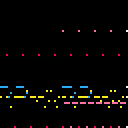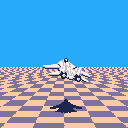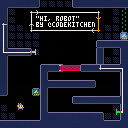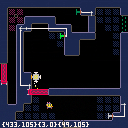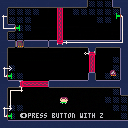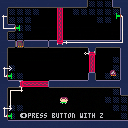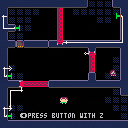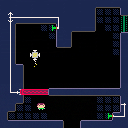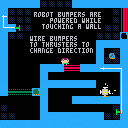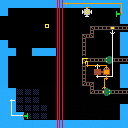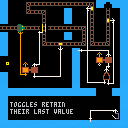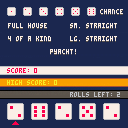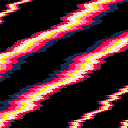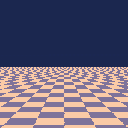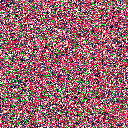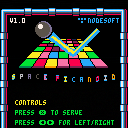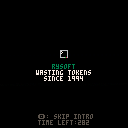My apologies if this was answered before, search didn't find me much...
Making maps in the IDE is frustrating, especially when they're big, full-width kind of things.
Is there anyway to import a tile map?
Like building it in a text editor and then pasting it in or something. Just the constant zooming/dragging is a mega pain.


Hi all,
(I am very aware that this is almost certainly a very stupid question, but if you don't ask...)
Does anyone know if it is possible to take some string content and convert it to functional/executable code in PICO-8/Lua?
[BACKGROUND]
I have LOTS of objects (tables) that all have their own, unique functionality. So unfortunately, there's little potential for sharing data/functions.
For example, many objects like this:
object_1 = {
name = "my object #1"
x = 8,
y = 4,
states = {145, 146, 147},
action = function()
-- code specific to this object here...
end
}
|
But as I don't need all these objects to exist at the same time (and could REALLY do with saving some tokens!), I'd like to somehow store these objects + functionality, e.g. within strings.
Then at a later time, restore these back into true objects/tables again.
Something like...
local my_stored_func = "function() -- code specific to this object here... end" local my_real_func = restore_function(my_stored_func) -- now execute the code my_real_func() |



On the web player, if a cart plays any sound in the very beginning, right as it starts, that sound seems to always get cut off.
e.g.: https://www.lexaloffle.com/bbs/?pid=11255&tid=2020
The same cart when played from the native player does not get its sound cut off at the beginning.
(I don't remember if it was always like this or if this was introduced at some point. I noticed it a while back when I posted this music visualizer; I had to add a delay at the start, as a work-around to avoid an unpleasant cutting off of the first note.)
I don't know anything about web audio so feel free to ignore this next part, but it seems like since there is already a boot screen intro before a cart starts, if there's some sort of audio buffer initialization that could be done there before the cart starts producing audio, that would be a perfect way to seamlessly fix this issue.
EDIT: I should add that I use Chrome on Linux and I have no idea if it happens on other OS/browser combos

If you don't know who Dainumo is, you should really check out his music over on his Soundcloud. This is a small cover of his song 2100 A.D. which has a very funky tune. I recommend listening to the original too. The cover itself isn't finished, but I would like to know if you would want me to finish it before going back to this project. Let me know what you think of this cover in the comment thread. Thanks for listening. :D
Code for Piano Roll is from Kittenm4ster.
I know this isn't strictly speaking Pico-8 related but I'm not much of a programmer and I get the feeling that a lot of the clever techniques that I see used here are...um...algorithmically standard things in terms of doing 2D graphics and movements and things like that and can probably be used in any 2D game programming language/library.
Does anyone know of any 2D gamedev resources to learn more that explain the math/algorithms involved in simple 2D games and effects? I've done exactly one game in Pico8 and it took a very long time because I don't know how to implement things that appear to be standard 2D videogamey things. Absolutely everything I know about game programming is in that game and it's basically just Pong (again).
Sorry for the off-topicness and potentially vague question.






This entire cart is 243 characters (plus six sprites). The code is just:
k,f,q,b=64,0,sqrt,btn x,y=k,k::a::cls(12)for j=3,k do s=j/4 sspr(q(q(s))*16-f%8/4,1,k+k,1,k-j*32,k+j,k*4*s,1)end r=b(1)p=22 if(r)x+=2,p=16 if(b(0))x-=2,p=16 if(b(2))y+=1,p=k if(b(3))y-=1,p=70 spr(28,x+8,99,4,2)spr(p,x,y,6,3,r)flip()f+=1 goto a |
It was a successful attempt to code the basics of a game in two tweets. There's actually enough room to clamp x and y to the screen. I hope someone will use this as a starter to make a real game.






Maybe it's just because it's late and I'm a bit fried...but hoping another set of "eyes" can help me think about map numbers.
I'm making another shmup. I have a map that is full-width and full-height (16,64) serving as the background. I have the map moving down with viewport being the bottom 16x16 of the map. So the initial map placement on screen is 0,-384
map(0,0, 0,-384, 32,128) |
I have a bunch of flagged sprites in the map that can be hit by bullets. I know how to use fget+mget to check the sprite flag.
The issue I'm having is how to get the x/y of the map tile while it's moving.
I know I need to use the bullet's x/y but I don't know how to match that up to the tile on the map that is scrolling by. I'm guessing it's some sort of offset(?) but I don't know what that would be or how to calculate it into a map tile position.
I'm moving the map down by .25 each tick. It's something that I need to track when a map row goes off the bottom of the screen or something...I dunno...my brain hurts. If you think of something, please share...maybe this will make more sense by lunchtime tomorrow :)
mapy=-384 function _draw() cls() map(0,0, 0,mapy, 32,128) mapy+=.25 end |

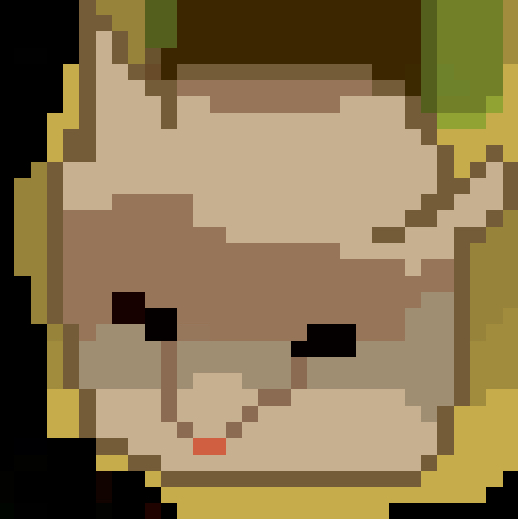
Hey, fellow Picos.
I am currently working on a book aiming to teach kids code games with PICO-8. Target audience is aged 8-14, so it will be a quite slow, careful approach suitable for all kinds of beginners, not just kids. I am writing it in both english and german (will have to have the english proofread though) and plan to initially fund it on kickstarter.com.
I would love to showcase some of the bestlooking games in it to show what's possible with Pico, will be going to approach some of you eventually to ask for your permission.
I have been teaching game development for kids for some years in a primary school and currently teach marketing- & management-students to make games using Pico.
If this sounds interesting to you, I'll keep you posted in here.
Best,
Tassilo










Like Yahtzee, but nacht—I mean, not. The rules slightly differ from Yahtzee. You can read about it on Wikipedia here.
Controls
[o]/z: hold die/select scoring category
[x]/x: roll
left/right: choose die and scoring category
up/down: switch between rolling and scoring
I made this a while ago, but never made the finishing touches (like a title screen). I still haven't, but I thought I'd upload it anyway.
Why settle for single renderings of a Mandelbrot when we can smoothly zoom in?
Features:
--Dithered Palette Animation
--Smooth Bilinear Zoom from sprite buffer
--Background Rendering of Mandelbrot into a (third?) buffer
The way this works is that we graphically zoom into initially rendered view of the Mandelbrot from the sprite buffer. While doing this, we are drawing the next level of Mandelbrot zoom into a second background buffer. When it's done, this gets copied into the zoom/sprite buffer. Lather, rinse, repeat.
Overall, a neat effect I think. Though, I wonder if I should trade the (more or less) smooth frame rate and dithering for less chunky pixels.
Also, I realize that I am awful at spelling "Mandelbrot".
-Electric Gryphon

Lesson: DON'T POKE VRAM.
Or poke anything for that matter.
Results: cartridge.
How did I manage to do this? I do not know in the slightest.
Anyways, enjoy.
EDIT: It also messes up audio.
-- WARNING --
Shrill and loud sound in the beginning!
THIS CODE MESSES UP YOUR PICO-8 SESSION!
DO NOT, I REPEAT, DO NOT RUN THIS IF THE SESSION IS IMPORTANT!
The colours in the shell WILL go weird after using this!
Please restart your PICO-8 with REBOOT or SHUTDOWN after using this!
-- New and improved version! --
No more shrill sound!
-- OLD VERSION --
[Warning!]
Loud sound in the beginning!

First Pico-8 game. Sorry it's Pong/Arkanoid again :) This is pretty much done simply because I can't think of anything else to add. I had to learn Lua at the same time so the code is probably pretty horrible. I'll update it for bug fixes and that but I'm probably going to move onto something else after this.
- 16 levels.
- 7 power ups.
- Persistent high-score.
- Whizzy particles.
Yeah, I guess that's it. Many thanks to the Pico-Hero guy for getting me started.



But is there any guides to installing this on a Raspberry Pi 3 that's running Raspbian? I've managed to transfer over the files and extract the folder but I have no clue as to how I'm supposed to run the program. I did make sure to download the rPi version as well.
Sorry if it's a bit of a newbie question. Just really want to try this thing out :)
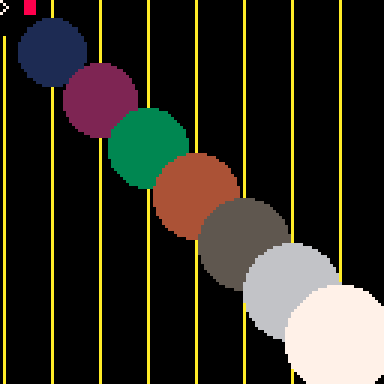







 2 comments
2 comments




